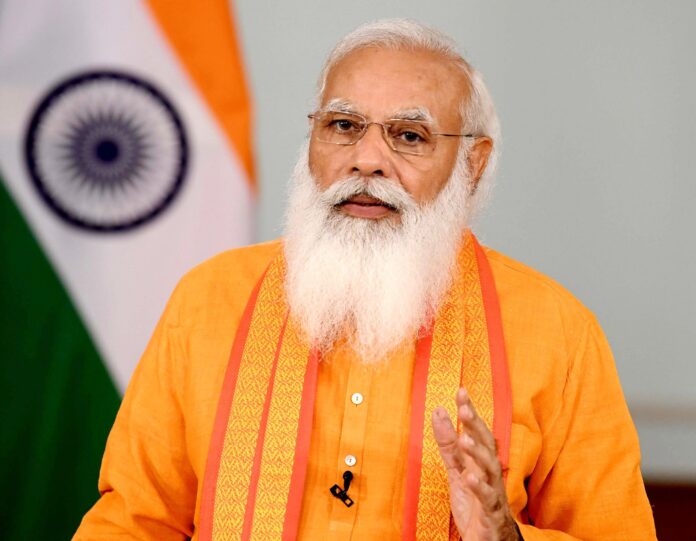New Delhi–The massive Union Cabinet reshuffle on Wednesday bears the techno-managerial imprint of Prime Minister Narendra Modi.
In his first term, Modi persisted with around 58 ministers in the Council of Ministers when the slogan was “Minimum Government, Maximum Governance”.
More or less, this number has persevered although now with 43 new members, the Council of Ministers now stands at 77, the highest in this government’s tenure.
It also marks the realisation that multiple portfolios with one minister may not be a very efficient ploy and representation needs to be given to different regions and for administrative efficiency, adequate numbers are required.
In addition, this reshuffle also bears the imprint of techno-managerial heft to boost administration. As the Modi government gets a makeover, the new Council of Ministers is being shaped in terms of experience and qualifications.
Modi had during interactions sought transformative ideas from the bureaucracy but since not much was achieved from that avenue, there seems to be an initiative to incubate ideas through technocracy.
In the new Council of Ministers, there are four former Chief Ministers in the Cabinet, 18 former state ministers, 39 former MLAs and 23 MPs who have been elected for three or more terms.
This demonstrates the wealth of experience in the new Cabinet as the government has been criticised for lack of bench strength and not enough heft in administrative experience.
The new ministers will also be an eclectic mix of distinguished qualifications including 13 lawyers, 6 doctors, 5 engineers, 7 former civil servants, 46 ministers with experience in central government.
This is also a young looking Cabinet with average age of the Cabinet at 58 and 14 ministers will now be below 50.
Apart from being a five-term MP, new Cabinet face Jyotiraditya Scindia has been a Cabinet minister in earlier Congress governments. He has an MBA from Stanford University and BA from Harvard University.
Another Cabinet minister, Ramchandra Prasad Singh is a Rajya Sabha MP from Bihar serving his second term as MP. He is a retired IAS officer of the 1984 batch, having served over 25 years across various capacities and domains.
Another new Cabinet minister, Ashwini Vaishnaw is a Rajya Sabha MP from Odisha. The 50-year-old is a former IAS Officer of the 1994 batch and was particularly known for his contribution to the PPP framework in Infrastructure. Post that, he has held leadership roles across major global companies such as General Electric and Siemens. He has an MBA from Wharton School, Pennysylvania University and MTech from IIT Kanpur.
Modi had inducted technocrats like Hardeep Puri, R.K. Singh and K.J. Alphons in the government. Puri and Singh have been promoted as Cabinet ministers and techno-managerial expertise is a quality being preferred among the new Cabinet faces.
Among the newly-appointed Ministers of State, Rajeev Chandrasekhar is a Rajya Sabha MP from Karnataka, serving his third term as MP.
He has enjoyed a long career as a successful entrepreneur across multiple industries. He has an MTech in Computer Science from Illinois Institute of Technology, along with Advanced Management Program from Harvard University.
Similarly, another new minister Meenakshi Lekhi is a Supreme Court lawyer and social worker. Subhas Sarkar is a Lok Sabha MP from Bankura in West Bengal, serving his first term as MP. He is a gynaecologist and board member of AIIMS Kalyani.
He holds an MBBS degree from Calcutta University and Certificate in Ultra Sonography, Infertlity and Laparoscopy.
Munjapara Mahendrabhai is a Lok Sabha MP from Surendranagar in Gujarat. Prior to his political career, he had a three-decade-long distinguished career as a cardiologist and Professor of Medicine in Gujarat. A social worker at heart, he offered medicines at Rs 2 and served as many as 8 lakh patients through various medical camps. He holds an MD in General Medicine and Therapeutics from Gujarat University.
Bhagwat Kishanrao Karad is a Rajya Sabha MP from Maharashtra, serving his first term as MP. A doctor by profession, he runs Dr Karad Multi Specialty Hospital & Research Centre in Aurangabad. He holds an MBBS, MS (General Surgery), MCh (Pediatric Surgery), and FCPS (General Surgery) degrees from Dr Babasaheb Ambedkar Marathwada University and Mumbai University.
Rajkumar Ranjan Singh is a Lok Sabha MP from Manipur, serving his first term as MP. Prior to his political career, he had a four-decade-long career as an Geography Professor, ending as Director of College Development Council in Manipur University.
Bharati Pravin Pawar is a Lok Sabha MP from Dindori in Maharashtra, serving her first term as MP. Before joining public life, she was a Medical Practitioner. She holds an MBBS degree in surgery from NDMVPS Medical College, Nashik.
Chauhan Devusinh is a Lok Sabha MP from Kheda in Gujarat, serving his second term as MP. He has been a two-time MLA in Gujarat Assembly. Prior to his full-time political career, he has served as an engineer in All India Radio.
Bhagwanth Khuba is a Lok Sabha MP from Bidar in Karnataka, serving his second term as MP. He hold a BTech degree in Mechanical Engineering from Sree Siddaganga Institute of Technology, Tumkur.
Bishweswar Tudu is a Lok Sabha MP from Mayurbhanj in Odisha, serving his first term as MP. Prior to his political career, he worked as a Senior Engineer in Water Resources Department in Odisha. He holds a Diploma in Electrical Engineering from Utkalmani Gopabandhu Institute of Engineering, Rourkela.
L. Murugan has practiced as a lawyer in the Madras High Court for 15 years before joining full-time public life. (IANS)
















